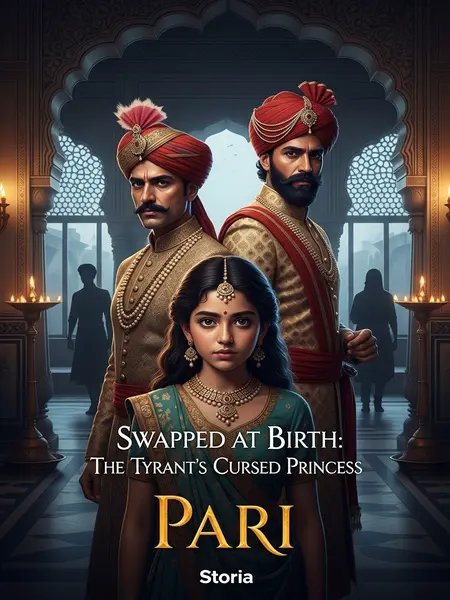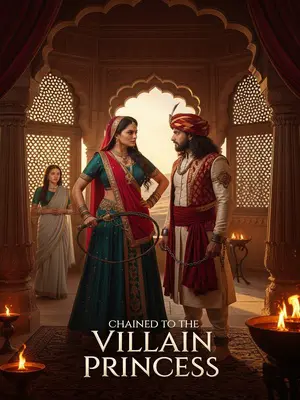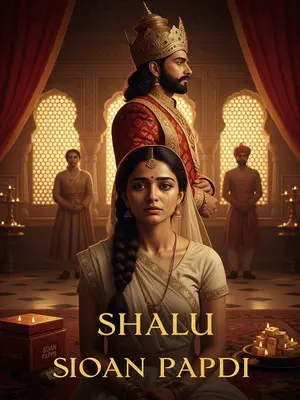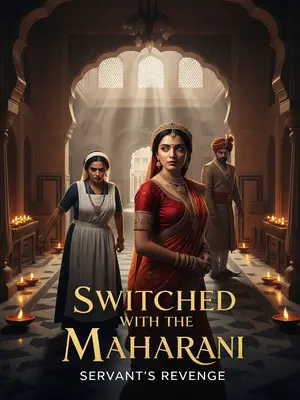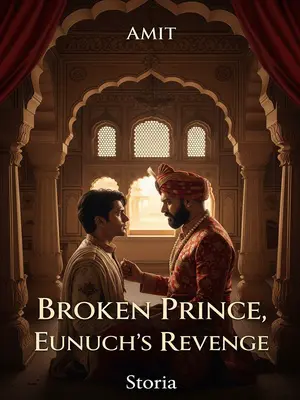Chapter 3: The Third-Day Ceremony and Palace Schemes
Newborns mostly sleep, so the palace was unusually quiet. But the scent of sandalwood lingered, the only sounds the faint clink of anklets and crows cawing beyond the jharokha.
On my third-day oil bath, I awoke to a bitter, fishy taste on my tongue—some ghastly kadha, worse than anything Dadi Sa forced down during the rains.
Ptooey—what is this, poison?
The ayah holding me shook in fear. “Princess, she—she’s not drinking milk. Maybe someone mixed medicine in it.”
Her voice quivered. Sweat pooled at her brow as she rocked me, terrified of Maharaja’s wrath.
I opened my eyes, but the world was a blur of red and gold—palace walls, silk sarees, embroidered juttis scuttling on marble.
A figure in royal yellow took me, voice ice-cold: “Send her out. Next ayah.”
His words sliced the room like a sharp chakku. The ayah bowed, whispering, “Ji, Maharaja,” and shuffled out, head down.
Ah, ah, ah.
Maybe it was blood ties, but I knew at once—this was my father, the one who’d love me more than his own life.
Warmth bloomed in my chest. I reached for him with chubby fingers, wanting to see his face clearly, to test my fortune-telling.
But I was too small—vision fuzzy.
Maharaja Rajveer, feeling my energy, softened instantly.
He was ready to declare me Crown Princess right there.
Chief Attendant Ramdas folded his hands, moustache quivering. “Your Highness, yeh galat hoga! Log kya kahenge?”
“Why not?” Rajveer wiped my drool, pride shining in his eyes. “This kingdom is mine to give—should I adopt some daydreaming cousin instead?”
“The princess’s fate is strong, but… newborns shouldn’t carry such burdens. It could bring misfortune.”
Ramdas’s voice dropped, eyes darting to the marble pillars, as if spirits might overhear.
I tilted my head, curious, but everything stayed blurry.
“Chalo, leave it.” Papa finally tucked away the order. “When my child grows strong, I’ll clear the path for her.”
He sighed—half relief, half longing.
Back then, I didn’t know Papa had made such a world-shaking choice.
There’d been no happiness in the palace for years. Even as a tiny princess, my third-day bath was grand—brass plates with rose petals and sandal paste, rupees tossed into the basin, the sound echoing off ancient arches.
I drooled at the sight of gold and silver, the thrill of so much wealth tingling in my bones.
Ayah Radha laughed, “Arrey, this Pari rani—Lakshmi ki choti behen lagti hai, hai na?”
My baby mind grew childish. When bored, I spat up milk endlessly.
Papa spun in circles, wiping my chin with his angavastram, grumbling, “Yeh bacche bhi na, sab ek jaise…”
“Is the child uneasy?”
Dadi Sa, experienced, slipped a gold chain around my neck. “Maybe she misses her mother. Take her to the Maharani.”
Her eyes shone as she tucked a black thread behind my ear. “Nazar na lage.”
Dadi Sa had lit thousands of diyas at temples, praying for a grandchild. Now, with me in her arms, she smiled as wide as the Thar.
Dadi Sa and Papa didn’t care for Maharani Jaya, but for my sake, they treated her gently.
Mother’s arms were warm, but her grip trembled. Even half-asleep, I heard her mutter, “I nearly died to bear you. Why not a son…?”
A hot tear splashed my forehead.
That night, a figure crept to my cradle, swapping in a peacock-swaddled baby. Shadows danced on the marble as a gust rattled the jharokha. The flicker of a lone diya sent chills through me.
I woke to see a strange baby with a tulsi-leaf birthmark. I tried to cry, but a handkerchief muffled my mouth—the taste of cloth thick on my tongue, my own heartbeat thudding in my ears. Terror closed in.
Kamini, the maid, glanced nervously at the jharokha, listening for footsteps before proceeding—palace eyes were everywhere.
Maharani Jaya woke and snapped, “Kamini, what are you doing?”
Kamini knelt, hands trembling as she produced a letter with the royal seal.
“This is Thakur Sahib’s order. The princess is too weak—let the cousin girl live instead. Newborns all look the same.”
Mother’s voice broke: “But—but this is my only daughter.”
Kamini pressed, “The Thakur’s family is all you have left. You can always have more children.”
Silence. Then, quietly, Mother said, “Find her a good family.”
The resignation in her tone stung more than any slap.
My heart dropped, a desert chill sweeping through me. Abandonment always hurts, no matter how many lives you’ve lived.
